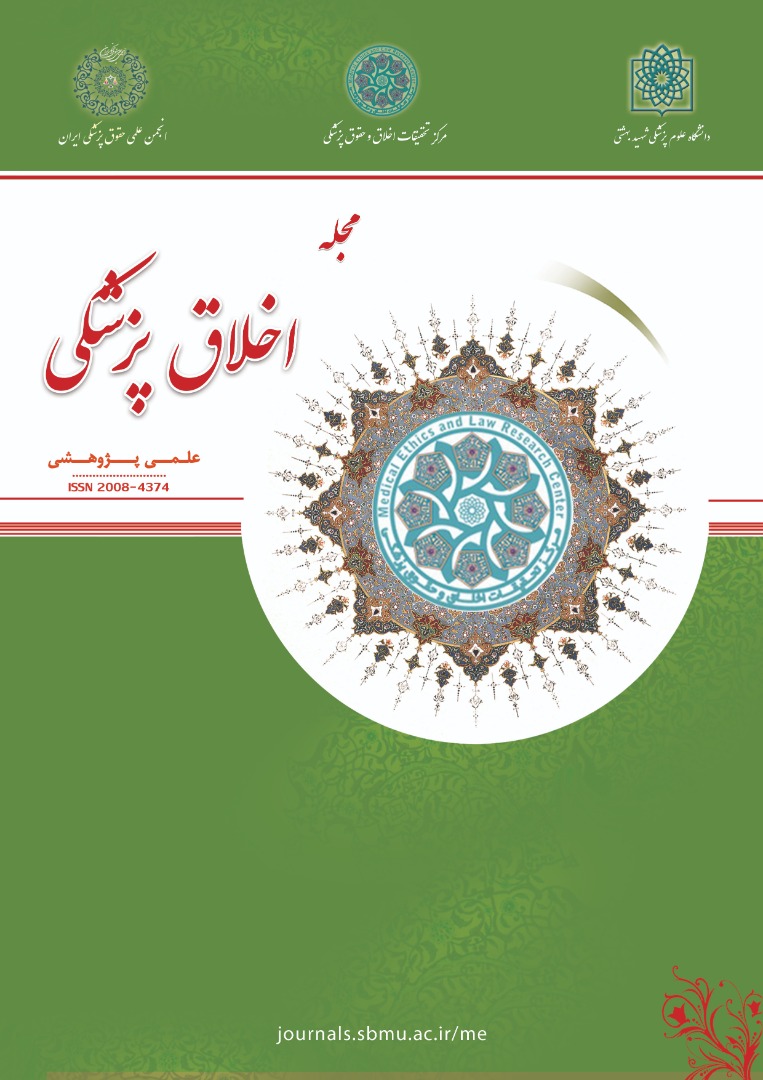بررسی میزان درماندگی اخلاقی پرستاران شاغل در مراکز آموزشی ـ درمانی وابسته به دانشگاه علوم پزشکی شهید بهشتی در سال 1392
مجله اخلاق پزشکی - علمی پژوهشی,
دوره 8 شماره 29 (1393),
1 مهر 2014
,
صفحه 121-143
https://doi.org/10.22037/mej.v8i29.7190
چکیده
درماندگی اخلاقی[i]پدیدهای شایع در حرفه پرستاری میباشد که میتواند سبب تعارض در زمینه مراقبت و رویارویی با بیمار و ارائه مراقبت با کیفیت شود که همین موضوع میتواند در روند دستیابی به اهداف سیستم مراقبتی مداخله ایجاد کرده و در نهایت بر الگوی سلامتی جامعه نیز تأثیرات سویی داشته باشد.دراین مطالعه توصیفی، 153 نفر از پرستاران شاغل در بیمارستانهای آموزشی منتخب دانشگاه علوم پزشکی شهید بهشتی، به روش سرشماری مورد بررسی قرار گرفتهاند. جهت بررسی دادهها از پرسشنامه اطلاعات فردی و پرسشنامه استاندارد درماندگی اخلاقی کورلی استفاده شده است. پایایی پرسشنامه از طریق ضریب همبستگی درون ردهای مورد بررسی قرار گرفته، که برابر با 0/88 بوده است. همچنین جهت تعیین ثبات درونی ابزار از ضریب الفای کرونباخ استفاده شده که برابر 0/87α= بوده است. نتایج پژوهش نشان داد که میانگین نمره درماندگی اخلاقی پرستاران 16/6± 44/8 بوده است که نشاندهنده سطح متوسط درماندگی اخلاقی میباشد. با توجه به پیامدهای درماندگی اخلاقی در پرستاران، آشنایی بیشتر با این پدیده و ارائه راهکارهایی برای مقابله با آن ضروری به نظر میرسد.پینوشتها
[i] .Moral Distress
- درماندگی اخلاقی؛ پرستاران؛ اخلاق در حرفه پرستاری
ارجاع به مقاله
مراجع
Abbaszadeh, A. Borhani, F. Nakhaei, N. Roshanzadeh, M. (2013). The relationship between moral distress and retention in nurses in Birjand teaching hospitals. Iranian Journal of Medical Ethics and History of Medicine. 6 (2): 57-62.
Abbaszadeh, A. Borhani, F. Nakhaei, N. Roshanzadeh, M. (2012). Moral distress in clinical practice: a cross - sectional study. Medical Ethics. 6 (21): 113-30.
Ameri, M. SafaviBayat, Z. Ashktorab, T. Kavoosi, A. Vaezi, A. (2013). Moral distress: evaluating nurses’ experiences. Iranian Journal of Medical Ethics and History of Medicine. 6 (1): 59-67.
Beikmoradi, A. Rabiee, S. Khatiban, M. Cheraghi, MA. (2012). Nurses distress in intensive care unit: a survey in teaching hospitals. Iranian Journal of Medical Ethics and History of Medicine. 5 (2): 53-63.
Corley, MC. (2002). Nurse moral distress: a proposed theory and research agenda. Nursing Ethics. 9 (6): 636-50.
Cummings, CL. (2012). The effect of moral distress on nursing retention in the acute care setting.
Ebrahimi, H. Nikravesh, M. Oskouie, F. Ahmadi, F. (2007). Stress: major reaction of nurses to the context of ethical decision making. Journal of Iran University of Medical Sciences. 14 (54): 7-15.
Elpern, E. Covert, B. Kleinpell, R. (2005). Moral distress of staff nurses in a medical intensive care unit. Amerecian Journal of Critical Care. 14 (6): 523-30.
Fogel, KM. (2007). The relationship of moral distress, ethical climate and intent to turnover among critical care nurse.
Fry, ST. Harvey, RM. Hurley, AC. Foley, BJ. (2002). Development of a model of moral distress in military nursing. Nursing Ethics. 9: 373-8.
Goethals, S. Gastmans, Ch. Dierckx, B. (2010). Nurses' ethical reasoning and behavior: a literature review. International Journal of Nursing Studies. 47: 635-50.
Harrowing, J. Mill, J. (2010). Moral distress among Ugandan nurses providing HIV care: a Critical ethnography. International Journal of Nursing Studies. 47: 723-31.
Kerfoot, KM. (1992). Preventing moral distress: our ethical obligation. Aspens Advise Nurse Exec. 7 (5): 3-5.
Lazzarin, M. Biondi, A. Di Mauro, S. (2012). Moral distress in nurses in oncology and hematology units. Nursing Ethics. 19 (2): 183-95.
Linda, D. Donelan, NK. Peter, I. Willis, BG. Williams, M. Ulrich, B. Dittus, R. (2005). The older nurse in the workplace: does age matter?. Nurse Econ. 23 (6): 9-282.
Ohinishi, K. Ohgushi, Y. Nakano, M. Fujii, H. Tanaka, H. Kitaoka, K. Nakahara, J. Narita, Y. (2010). Moral distress experienced by psychiatric nurses in japan. Nursing Ethics. 17 (6): 726-40.
- چکیده مشاهده شده: 592 بار
- PDF (English) دانلود شده: 195 بار
